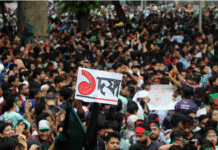Jalal Uddin Khan
However, some ultra-liberal secularists see Islam and Muslims as “the other,” just as the medieval Christian crusaders did. The fanatically liberated ultra-secularists engage in anti-Muslim polemics using their retarded and retrograde intellectualism to establish misconceptions and distortions about the 1400 hundred years of Islamic civilization. One does not have to renounce one’s religious beliefs and degenerate into God-less atheism to become a radical and freethinking mukto-mona of mukto-chinta. Weren’t the thousands of prophetic guides and preachers in Islam, Judaism, Christianity, and Buddhism, including Socrates, Confucius and the Dalai Lama, mukto-mona people endowed with mukto-chetona? Kind, charitable, loving, just, fair, strong and impartial, didn’t they set up a religion-based system of their own and a culture of religious ethos for the emancipation of humankind from the clutches of dark superstitions? Just as all systems and civilizations go through an evolving process—cyclical (spiral or gyre-like), linear or conical—they, as advocates of different religions and beacons of hope, launched different guiding principles and civilizations and had their own evolutionary process. If an atheist or a libertinist dislikes a practicing believer and distorts or misinterprets his religious views and beliefs, how can he be called a freethinking mukto-mona?
If he does so, a believer also, as a human being of flesh and blood and all kinds of emotions, would be prompted to react the same way, only to be vilified, unfairly though, as a non-mukto-mona. It seems as if discarding everything enlightening, institutionalizing and systematizing and being an anarchical epicurean pagan hedonist are preconditions for being a mukto-mona, who is in fact very likely to ultimately lapse into a stagnant baddho-mona. Like the terms of “reform” or “reformists” and “songlap/dialogue,” which are not welcome to some in the recent political culture of Bangladesh (depending on who you ask), mukto-mona also is viewed as and has in fact deteriorated into a term of irritation, allergy, suspicion and embarrassment, not well-liked in many quarters. Since no human can ever rise above biases and every human has his traditional, cultural and religious prejudices, none can ever claim to be a mukto-mona, unless one is divinely illumined or endowed with the prophethood of divine light. However, the minimum a mukto-mona can do is to believe and engage in a bi- or multilateral songlap with all the representative parties to solve the problems facing the nation today.
Zealous secularists
In their all-out crusading jihad against Islam, the zealous secularists are like the ultra-feminists, who would like to expand the role of women and their persons to the exclusion of men and see everything as a mere tool of male domination or a mechanism for female subordination, just as the Marxists see everything as a matter of class struggle and economic exploitation. Out of their “profound” fascination for secularism, the so-called mukto-mona secularists are more excited, for example, about the Western Valentine’s Day (February 14) and similar other occasions in a Muslim country more than their Western cohorts themselves are in their own countries, just to show off their fashionable mukto-chetona and unfounded trepidation about Islam.
Spanning from North and West and East Africa to the entire Middle East (for example, the Fatimids and the Mameluks in Egypt, the Umayyads in Damascus and the Abbasids in Baghdad), Muslim Spain and Sicily, Muslim Constantinople (Istanbul) and Ottoman (Osmanli) Turkey, Safavid Persia, Afghanistan, Pakistan, Mughal India, entire Central Asia, South Asia and South East Asia, Islam is a civilization that immensely contributed during the Middle Ages to the making of the scientific world—astronomical, astrological, mathematical, geographical, medical, legal, architectural, philosophical and cultural sphere. Islamic culture was at the forefront of modernization from the 8th to 15th century when its contributions gave rise to the European Renaissance. Going beyond translating the works of their Greek, Roman, Persian/Iranian, and Indian predecessors, Arabic-speaking Muslim scientists reached new heights in the knowledge of many new disciplines. For an idea of Arab/Muslim achievements in the various fields of sciences and their application, one may mention Ahmad Hassan & Donald Hill’s Islamic Technology (1986); Salim Al-Hassani’s 1001 Inventions: Muslim Heritage in Our World (2006); Mark Graham’s How Islam Created the Modern World (2006); Victor Katz’s The Mathematics of Egypt, Mesopotamia, China, India, and Islam (2007); George Saliba’s Islamic Science and the Making of the European Renaissance (2007); and George G. Joseph’s The Crest of the Peacock: Non-European Roots of Mathematics (1991, 2011). Charles Singer, an Oxford professor of the history of science and author of a five-volume survey of technology, was one of the first western scholars to acknowledge Arab scientific primacy in the Middle Ages. Writing nearly 50 years ago, Singer contended that during most of the period from 500 to 1500, “technologically, the West had little to bring to the East. The technological movement was in the other direction.”
Universities of the world
The first universities of the world were established in Morocco and Cairo, about a century and a half before there was Oxford in 1096 and two hundred years before there was Cambridge in 1210. Like the themes of the annually-held RIS (Reviving Islamic Spirit) conferences in North America, the theme of the 11th annual (2005) IAW (Islamic Awareness Week) in England was 1000 Years of Britain in Islam, which suggests that Islam’s British connections are historically very long. For example, Abelard of Bath, tutor to Henry II (1154–1189), is known for translating many important Greek and Arabic scientific works from Arabic into Latin, which were then introduced to Western Europe. Salim Al-Hassani’s classic 1001 Inventions: The Enduring Legacy of Muslim Civilization (National Geographic: Washington, D.C., 2012; 1st ed. 2006) chronicles the great contributions of the Muslim Middle Ages.
No one should forget the historical fact that after they retook the Muslim “Moorish” Andalusia (Southern Spain), Spanish Christians burnt more than one million books by Muslims in Granada towards the close of the 15th century. It was about the same time that the Europeans led by the Italian poet and “humanist” Petrarch banned all Arabic/Islamic sources of knowledge from their academic courses and threw out all such books from the shelves at the seats of higher learning. However, nearly two hundred years later, Oliver Cromwell and his contemporaries are said to have known the basic tenets of the Qur’an. Arabic texts are thought to have been frequent at the universities of Oxford and Cambridge since the 17thcentury. As Sebastian Prange mentions in his “Thomas Jefferson’s Al-Koran” (Saudi Aramco World, July/August 2011), Jefferson, since his days as a law student, had a copy of the Qur’an in what was the first popular translation (1734) by George Sale, also a lawyer. This speaks a lot about the American president’s legacy of religious freedom and pluralism. He found the Qur’an useful as he wanted to broaden the base of his legal studies.
Jefferson’s studies
In his attempt to do so, Jefferson also studied the standard work on comparative law of his time, Of the Law of Nature and Nations (1672) by Samuel von Pufendorf. The German scholar made numerous references to Islam and the Qur’an, some of course in criticism, expected of a European, but some in approval, especially those related legal precedents. He cited “the Qur’an’s emphasis on promoting moral behavior, its proscription of games of chance and its admonition to make peace between warring countries.” Keeping with Pufendorf, Sale, in his preface, wrote: “If the religious and civil Institutions of foreign nations are worth our knowledge, those of Mohammed, the lawgiver of the Arabians, and founder of an empire which in less than a century spread itself over a greater part of the world than the Romans were ever masters of, must needs be so.” Sale described the Prophet of Islam as “richly furnished with personal endowments, beautiful in person, of a subtle wit, agreeable behavior, showing liberality to the poor, courtesy to everyone, fortitude against his enemies, and, above all, a high reverence for the name of God.” (For the above quotes, see Prange in SAW). The findings of the two scholars, one German and one English, foreshadowed those of Edward Gibbon, Johann Wolfgang Goethe, Edmund Burke, Thomas Carlyle, Leo Tolstoy, Jean-Jacques Rousseau, Rainer Maria Rilke, Oswald Spengler, Bernard Shaw, and Bertrand Russell, mentioned below again.
Source: Weekly Holiday









